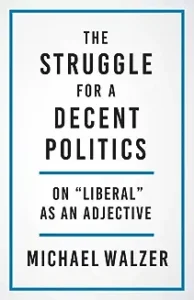The Struggle for a Decent Politics: On “Liberal” as an Adjective by Michael Walzer 2023
Walzer, one of today’s most cogent and distinguished political philosophers, has written an important and readable book. Nearing 90, he has written in the past about the just war, egalitarian justice, and other political theory, and in this volume, he condenses a lifetime of thought and analysis into a concise plea for a politics that is liberal using that phrase as an adjective rather than a noun.
Walzer posits that in the past, the noun liberal referred to a the politics or the cultural character of an emancipated individual imbued with the values of the Western Enlightenment. Rather, in this multicultural, pluralistic, and increasingly threatened world, there are no such individuals and that the values of liberalism should now be applied as an adjective to the various political ideologies swirling about.
In chapters devoted to Democrats, Socialists, Nationalists and Internationalists, Communitarians, Feminists, Professors and Intellectuals, and finally Jews, Walzer argues that the values of liberalism can be incorporated into these various philosophies and have the ability to humanize them. Rather than arguing for a singular approach to how we govern society, he proposes that liberalism’s key features—open-mindedness, generosity, tolerance, compassion, humor, a gentle irony and the rejection of bigotry and cruelty—can be a part of each of these ideologies and can reduce the friction and conflict in today’s world of competition between them.
He argues that these values are both universal and worth fighting for in a world where everybody is ‘radically imperfect’, and he puts ‘liberal’ in oppostion to ‘populist’ by characterizing the latter as unconcerned at best and violently intolerant at worst of minority rights. His emphasis is on education as the primary means of including everyone in society and imbuing the citizenry with the values of the democratic ethic.
Walzer is not a cockeyed optimist, but a realist whose life as editor of Dissent and as a leading public intellectual from his position at Princeton’s Institute for Advanced Study has provided him with a singular vantage point from which to comment on today’s political conflicts in the US and internationally. In the face of trump, Orban, Netanyahu and others, he maintains a hopeful stance believing that the liberal values can rescue the world from its increasingly authoritarian, exculsionary, and xenophobic direction. The means are respecting and including minorities, educating citizens, and including liberal values into even the most nationalistic and orthodox segments of society.
The book is readable and thought-provoking. At a concise 160 pages, it can also be read in a few sittings. I highly recommend it as an antidote to today’s newspaper headlines. Don’t lose hope is the main message, but a message conveyed with a call to action to those citizens who prize these liberal values.



